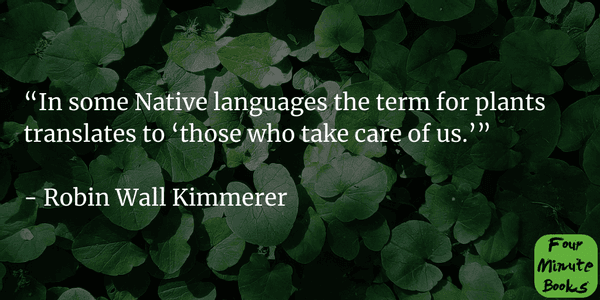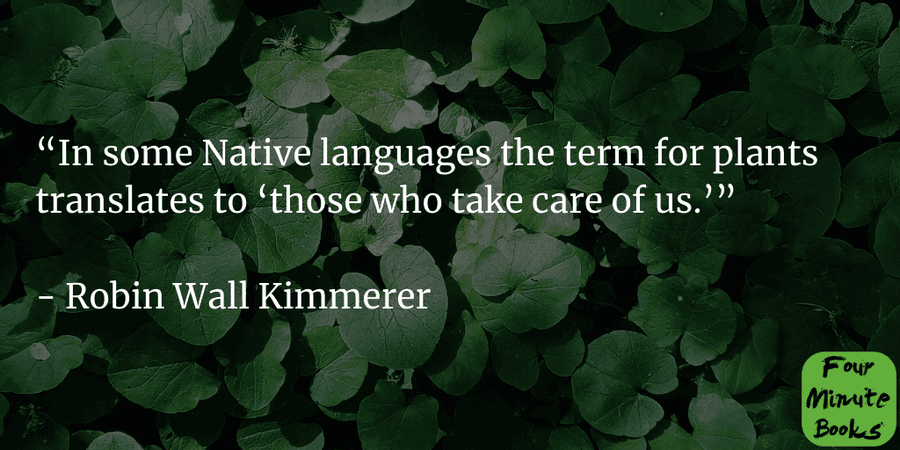Braiding Sweetgrass Summary
Curated from: fourminutebooks.com
Ideas, facts & insights covering these topics:
17 ideas
·1.62K reads
8
1
Explore the World's Best Ideas
Join today and uncover 100+ curated journeys from 50+ topics. Unlock access to our mobile app with extensive features.
Author Quote
"In some Native languages the term for plants translates to 'those who take care of us.'"
-Robin Wall Kimmerer
24
428 reads
Braiding Wweetgrass - Book Summary (Native APlanet Care)
Braiding Sweetgrass offers some great ways for all of us to take better care of and be more grateful for our planet by explaining the way that Native Americans view and take care of it.
15
238 reads
Book Overview
The environment is in trouble. There’s global warming, species are dying , coasts are rising, and our demand for natural resources never stops increasing.
What can we do about it? People fight to make laws limiting our use of resources and switching to cleaner ones. Things are starting to change. But what if the real solution will come by changing the way we look at our environment completely?
19
133 reads
In Braiding Sweetgrass: Indigenous Wisdom, Scientific Knowledge and the Teachings of Plants , Robin Wall Kimmerer gives us a unique view on how to care for Mother Nature. As a Native American and environmental biologist, she brings a unique perspective on how to face our environmental challenges.
She teaches us to treat the Earth as a beloved family member rather than a resource we can take freely from.
19
99 reads
Top 3 Book Lesa
- The Native American people can teach us a lot about how to interact with our environment.
- If we want to have a sustainable environment, we need to start changing our ways to be more reciprocal.
- To protect our future, we have to start teaching the next generation how to care for the Earth.
Ready to learn some lesser-known ideas about caring for our planet? Here we go!
18
93 reads
Lesson 1: Native American Culture Emphasizes Respect And Care f
Kimmerer ‘s experience growing up as a Native American in modern America was one of clashing cultures. It seemed the country and her tribe were at constant odds.
Kimmerer spent a lot of time with her grandmother and the Potawatomi tribe. But for the majority of time lived in upstate New York. One major difference she noticed was in the way both cultures treated nature.
17
77 reads
She gives an example of wild strawberries that grew in a field by her school. She considers these kinds of offerings as part of the world’s gift economy, or things the world offers without expectation of something in return.
But in Potawatomi culture, it is tradition to reciprocate gifts like this. So at the end of the season, she would return to the spot and find seedlings and prepare new plots for strawberries.
17
66 reads
The relationship should be like one between two people who care about each other . They take care of each other not because they have to, but because they want to . But Kimmerer saw that most people do not practice this kind of gift economy.
19
58 reads
Lesson 2: We Need To Start Working In Harmony With Nature
Native Americans understand and respect the cyclical nature of life around them. A woman will start out in the Way of The Daughter, where she will learn about the world around her from her parents. Then she enters the Way of the Mother, where she passes her knowledge on to the next generation. Finally, she will go to the Way of the Teacher, where she gives back to the community and helps parents.
15
59 reads
Kimmerer said she put this way of thinking to use when she came across a polluted local pond where birds would get stuck in the algae. She took care of the pond for 12 years by cleaning it and clearing it of algae.
This type of caring becomes a cycle. Now the birds are thriving, and as the pond runs down to other ponds they benefit too. This is much different than the way we tend to treat the Earth and its resources by doing things like mining with no reciprocation.
17
54 reads
Many tribes practice the Honorable Harvest, where they take only what they need and leave nature to regenerate and it will give back to us. She says instead of just throwing paper away and not thinking about the trees that gave it to you, try considering the gifts this tree has given you and give back by participating in a local, tree planting program.
16
47 reads
Lesson 3: Teaching The Next Generation About Respect Is Key
In the face of climate change , it’s essential that we change our way of thinking. And because the future of the planet lies in the hands of the next generation, it’s our responsibility that they grow up with a sense of gratitude for nature.
One way the author thinks we can instill this way of thinking in the next generation is to have a pledge thanking Mother Nature.
17
46 reads
Native American schools have already done this in what they call a Thanksgiving Address where they thank Mother Earth for providing us with water, food , and shelter.
This could help them start each new day with gratitude for what the Earth gives rather than just seeking to consume more. It could even help encourage them to give back and try to change the world.
16
40 reads
There is so much hope in the next generation and what they can do if they feel more connected to nature . The Potawatomi teach us a valuable lesson: only by giving back in the present can we continue to take in the future.
15
40 reads
Braiding Sweetgrass - Book Review
Braiding Sweetgrass is an excellent book. My grandpa has a lot of good relationships with Native American people and although I don’t know many personally, I have a lot of respect for them based on his stories. I think we can and should learn a lot from their ways of seeing and taking care of the world!
15
41 reads
Who would I recommend Braiding Sweetgrass sto?
The 22-year-old college student who is in a botany class, the 49-year-old environmentalist who wants more ways to help the planet, and anyone that enjoys a more holistic look at science.
16
51 reads
IDEAS CURATED BY
CURATOR'S NOTE
Braiding Wweetgrass - Book Summary (Native American Planet Care)
“
Tom Joad's ideas are part of this journey:
Learn more about philosophy with this collection
How to make rational decisions
The role of biases in decision-making
The impact of social norms on decision-making
Related collections
Similar ideas
20 ideas
An Invisible Thread Summary
fourminutebooks.com
15 ideas
Untamed Summary
fourminutebooks.com
13 ideas
The Universe Has Your Back Summary
fourminutebooks.com
Read & Learn
20x Faster
without
deepstash
with
deepstash
with
deepstash
Personalized microlearning
—
100+ Learning Journeys
—
Access to 200,000+ ideas
—
Access to the mobile app
—
Unlimited idea saving
—
—
Unlimited history
—
—
Unlimited listening to ideas
—
—
Downloading & offline access
—
—
Supercharge your mind with one idea per day
Enter your email and spend 1 minute every day to learn something new.
I agree to receive email updates

